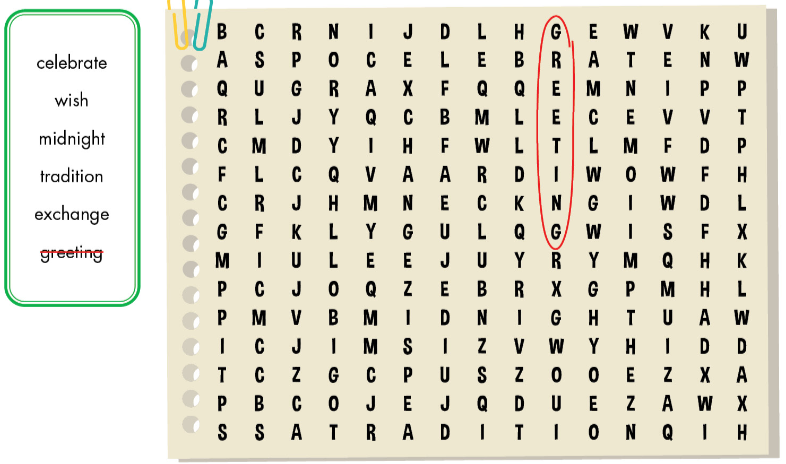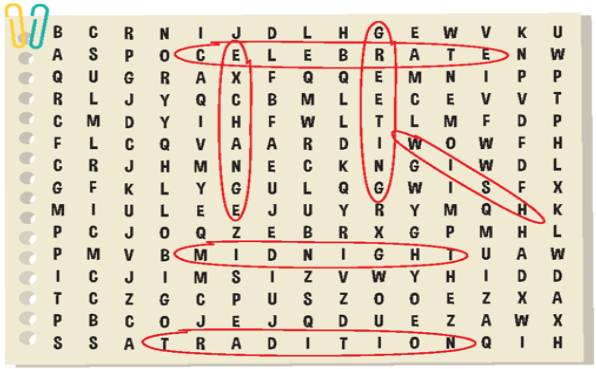Lesson 2 - Unit 8. Festivals around the World - SBT Tiếng Anh 7 iLearn Smart World
New words: a. Fill the words in the word search. b. Fill in the blanks with the words from Task a. Listening: a. Listen and choose the correct sentence. b. Now, listen and circle the correct sentence. Grammar: a. Fill in the blanks with like or different from. b. Unscramble the sentences. Writing: Write a paragraph about a festival you went to. Use the questions below to help with your writing. Write 60 to 80 words.
New words a
a. Fill the words in the word search.
(Điền vào các từ trong tìm kiếm từ.)

Lời giải chi tiết:

- celebrate (kỉ niệm)
- wish (mong ước)
- midnight (nửa đêm)
- tradition (truyền thống)
- exchange (trao đổi)
- greeting (lời chào)
New words b
b. Fill in the blanks with the words from Task a.
(Điền vào chỗ trống với các từ trong Bài tập a.)
1. "Hello, how are you?" is a greeting we use every day.
2. When the clock shows __________,the new year will begin.
3. You should make a ___________before you blow out the candles.
4. I will _________my birthday by having a party.
5. We always _______lucky money with our family on New Year's Eve.
6. Wearing áo dài is an important Vietnamese ___________.
Lời giải chi tiết:
1. "Hello, how are you?" is a greeting we use every day.
("Xin chào, bạn có khỏe không?" là một lời chào chúng ta sử dụng hàng ngày.)
2. When the clock shows midnight , the new year will begin.
(Khi đồng hồ chỉ nửa đêm, năm mới sẽ bắt đầu.)
3. You should make a wish before you blow out the candles.
(Bạn nên thực hiện một điều ước trước khi thổi nến.)
4. I will celebrate my birthday by having a party.
(Tôi sẽ kỉ niệm sinh nhật của mình bằng cách tổ chức một bữa tiệc.)
5. We always exchange lucky money with our family on New Year's Eve.
(Chúng tôi luôn đổi tiền lì xì với gia đình vào đêm giao thừa.)
6. Wearing áo dài is an important Vietnamese tradition.
(Mặc áo dài là một truyền thống quan trọng của Việt Nam.)
Listening a
a. Listen and choose the correct sentence .
(Nghe và chọn câu đúng.)
1. Julie lives in Hoi An.
2. Julie is going to visit Hoi An.
Phương pháp giải:
Bài nghe
Julie: Hey, Nick. Have you heard about the lantern festival in Hoi An?
Nick: No, Julie.What is it?
Julie: It's a festival in the town of Hoi An.They decorate the streets with colored paper lanterns.
Nick: Wow, that sounds great.
Julie: Yes, the town is lit up with lanterns at night. It's beautiful.
Nick: Is it a Vietnamese tradition?.
Julie: Yes, it's an old festival.It's very popular.
Nick: When is it?
Julie: It's on the 14th day of each lunar month. This month it will be on the 18th. But I'm going on the 19th.
Nick: Have your parents booked the hotel?
Julie: Not yet. They wanted to stay in Hawaii, but all the hotels will be full. So we'll stay in Da Nang. Do you want to come?
Nick: Yes, but let me ask my parents. I'll tell you if I can come on Saturday.
Tạm dịch:
Julie: Này, Nick. Bạn đã nghe đến lễ hội đèn lồng ở Hội An chưa?
Nick: Không, Julie. Cái gì vậy?
Julie: Đó là một lễ hội ở thành phố Hội An, họ trang trí đường phố bằng những chiếc đèn lồng giấy màu.
Nick: Chà, nghe hay đấy.
Julie: Vâng, thị trấn được thắp sáng bởi những chiếc đèn lồng vào ban đêm. Nó rất đẹp.
Nick: Đó có phải là một truyền thống của Việt Nam?
Julie: Vâng, đó là một lễ hội cũ, nó rất phổ biến.
Nick: Khi nào vậy?
Julie: Đó là vào ngày 14 mỗi tháng âm lịch. Tháng này nó sẽ vào ngày 18. Nhưng tôi sẽ đến ngày 19.
Nick: Bố mẹ bạn đã đặt khách sạn chưa?
Julie: Chưa. Họ muốn ở lại Hawaii, nhưng tất cả các khách sạn sẽ kín chỗ. Vì vậy, chúng tôi sẽ ở lại Đà Nẵng. Bạn có muốn đến không?
Nick: Vâng, nhưng để tôi hỏi bố mẹ tôi. Tôi sẽ nói với bạn nếu tôi có thể đến vào thứ Bảy.
Lời giải chi tiết:
The correct answer is 2. Julie is going to visit Hoi An .
(Câu trả lời đúng là Julie sẽ đến thăm Hội An.)
Listening b
b. Now, listen and circle the correct sentence.
(Bây giờ, hãy lắng nghe và khoanh tròn vào câu đúng.)
1. They make the lanterns from...
( Họ làm những chiếc đèn lồng từ ...)
a. wood. (gỗ)
b. paper. (giấy)
c. plastic . (nhựa)
2. The town with lanterns looks beautiful...
( Thị trấn với những chiếc đèn lồng trông thật đẹp ...)
a. in the morning. (vao buổi sáng)
b. at night. (về đêm)
c. in the afternoon. (vào buổi chiều)
3. Julie will go to Hội An on...
(Julie sẽ đến Hội An vào ...)
a. the 14. (ngày 14)
b. the 19th. (ngày 19)
c. the 18th. (ngày 18)
4. Julie will stay in a hotel in...
(Julie sẽ ở một khách sạn ở ...)
a. Hoi An.
b. Hanoi.
c. Đà Nẵng.
Lời giải chi tiết:

1. b
They make the lanterns from paper .
(Họ làm những chiếc đèn lồng từ giấy.)
2. b
The town with lanterns looks beautiful at night .
( Thị trấn với những chiếc đèn lồng trông thật đẹp về đêm.)
3. b
Julie will go to Hội An on the 19th .
(Julie sẽ đến Hội An vào ngày 19.)
4. c
Julie will stay in a hotel in Đà Nẵng .
(Julie sẽ ở một khách sạn ở Đà Nẵng.)
Grammar a
a. Fill in the blanks with like or different from .
(Điền vào chỗ trống sử dụng like hoặc different from.)
1. Thai New Year is different from Vietnamese New Year. In Thailand it's in April, but in Vietnam it's in February.
2. People in England celebrate Christmas by decorating a Christmas tree, ________people in Germany.
3. Vietnamese food is_________Thai food. Thai food is very spicy, but most Vietnamese food is not very spicy.
4._________Vietnamese people, Thai people like to travel back to their hometown for the New Year.
5. Christmas in Italy is_________Thailand, Christmas is a national holiday, but in Thailand it isn't.
Phương pháp giải:
• Chúng ta sử dụng be + different với để nói về một điều không giống với một hoặc các mặt hàng khác.
• Chúng ta sử dụng like + danh từ để nói rằng hai điều tương tự.
Lời giải chi tiết:
1. Thai New Year is different from Vietnamese New Year. In Thailand it's in April, but in Vietnam it's in February.
(Tết Thái Lan khác Tết Việt. Ở Thái Lan là vào tháng Tư, nhưng ở Việt Nam là vào tháng Hai.)
2. People in England celebrate Christmas by decorating a Christmas tree, like people in Germany.
(Người dân ở Anh đón Giáng sinh bằng cách trang trí cây thông Noel, giống như người dân ở Đức.)
3. Vietnamese food is different from Thai food. Thai food is very spicy, but most Vietnamese food is not very spicy.
(Đồ ăn Việt Nam khác với đồ ăn Thái Lan. Đồ ăn Thái rất cay, nhưng hầu hết đồ ăn Việt Nam không cay lắm.)
4. Like Vietnamese people, Thai people like to travel back to their hometown for the New Year.
(Cũng như người Việt Nam, người Thái thích về quê ăn Tết.)
5. Christmas in Italy is different from Thailand, Christmas is a national holiday, but in Thailand it isn't.
(Giáng sinh ở Ý khác với Thái Lan. Ở Ý, Giáng sinh là một ngày lễ quốc gia, nhưng ở Thái Lan thì không.)
Grammar b
b. Unscramble the sentences
(Sắp xếp các câu sau.)
1. people./Vietnamese/eat/people/lot/Korean/of/noodles/like/a
Vietnamese people eat a lot of noodles like Korean people.
2. from/different/Korean/American/food/food./is
_____________________________________
3. Vietnamese/five/in/holiday/New/Year/lasts/like/days/Thailand./The
_____________________________________
4. from/cake/in/South Korea./rice/Traditional/rice/cake/different/Vietnamese/is
_____________________________________
Lời giải chi tiết:
1. Vietnamese people eat a lot of noodles like Korean people./Korean people eat a lot of noodles like Vietnamese people.
(Người Việt Nam ăn nhiều mì như người Hàn Quốc. / Người Hàn Quốc ăn nhiều mì như người Việt Nam.)
2. American food is different from Korean food. /Korean food is different from American food
(Đồ ăn Mỹ khác đồ ăn Hàn Quốc. / Đồ ăn Hàn Quốc khác đồ ăn Mỹ)
3. The Vietnamese New Year holiday lasts five days like in Thailand.
(Kỳ nghỉ Tết Dương lịch của Việt Nam kéo dài năm ngày như ở Thái Lan.)
4. Traditional Vietnamese rice cake is different from rice cake in South Korea.
(Bánh gạo truyền thống của Việt Nam khác với bánh gạo ở Hàn Quốc.)
Writing
Write a paragraph about a festival you went to. Use the questions below to help with your writing. Write 60 to 80 words .
(Viết đoạn văn kể về một lễ hội mà bạn đã đến. Sử dụng các câu hỏi dưới đây để giúp bạn viết bài. Viết từ 60 đến 80 từ)
1. What was the festival? (Ngày hội là gì?)
2. When did you go? ( Bạn đi lúc nào?)
3. What did you do? (Bạn đã làm gì?)
4. Did you enjoy it? (Bạn có thích nó không?)
5. Was it the same or different from other festivals you visited?
Lời giải chi tiết:
Last year I went to the Songkran festival. It takes place in Chiang Mai, Thailand. I went there last April with my mother, my sister, and my grandparents. I had a lot of water fights and ate traditional Thai food. I had a great time and made many new friends. It was different from Vietnamese New Year, but it was fun.
(Năm ngoái tôi đã đến lễ hội Songkran. Nó diễn ra ở Chiang Mai, Thái Lan. Tôi đã đến đó vào tháng 4 năm ngoái với mẹ tôi, chị gái tôi và ông bà của tôi. Tôi đã có rất nhiều cuộc chiến dưới nước và ăn các món ăn truyền thống của Thái Lan. Tôi đã có một khoảng thời gian tuyệt vời và có nhiều bạn mới. Nó khác với Tết Việt Nam, nhưng thật vui.)